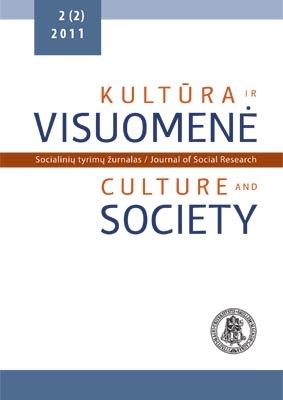Biseksualių asmenų patirtys ir biseksualios socialinės tapatybės formavimasis Lietuvoje
The Experiences of Bisexuals and the Formation of Bisexual Social Identity in Lithuania
Author(s): Darja LyzenkoSubject(s): Cultural Essay, Political Essay, Societal Essay
Published by: Vytauto Didžiojo Universitetas
Keywords: biseksualumas; socialinė tapatybė; LGBT; tapatybės formavimasis; bifobija; monoseksizmas; bisexuality; social identity; LGBT; identity formation; biphobia; monosexism
Summary/Abstract: Dėl vyraujančios homofobijos ir heteronormatyvumo Lietuvoje biseksualumas traktuojamas kaip neigiamas reiškinys. Pagrindinis šio tyrimo tikslas – išskirti esminius socialinius sunkumus, su kuriais susiduria biseksualūs asmenys Lietuvoje, ir išanalizuoti, kokį poveikį šie sunkumai daro biseksualios socialinės tapatybės formavimuisi. Teorinis darbo pagrindas yra Henrio Tajfelio socialinės tapatybės teorija ir LGB (lesbietės, gėjaus, biseksualo) tapatybės vystymosi raida. Siekiant tyrimo tikslo imta 11 pusiau struktūruotų interviu iš Lietuvoje gyvenančių biseksualių vyrų ir moterų. Tyrimas parodė, kad vienareikšmiškai perteikti biseksualių asmenų santykį su socialine tikrove sudėtinga. Viena vertus, biseksuali socialinė tapatybė Lietuvoje formuojasi labai vangiai, nes susiduriama su daugybe kliūčių. Kita vertus, informantai beveik vienbalsiai teigė, jog jiems, kaip biseksualams, Lietuvoje „gyventi yra lengviau“ negu homoseksualios orientacijos asmenims. Esminė to priežastis – galimybė kaitalioti tapatybes ir dažniausiai sakyti „tik pusę tiesos“. The article focuses on the lives of bisexual men and women in Lithuania. As a consequence of homophobia and heteronormativity in the country, bisexuality is regarded as at least to some extent an unacceptable set of sexual preferences and practices. Therefore, bisexuals as members of a subordinated social group are forced to deal with their negative identity and its consequences. The article analyzes how bisexuals as members of a negatively regarded social group construct their bisexual social identity and what main obstacles they encounter in doing it. The theoretical background of this study is based on Henri Tajfel’s social identity theory and on the integrated LGB (Lesbian, Gay, Bisexual) identity formation stage model. Eleven semi-structured interviews with bisexual men and women living in Lithuania were conducted for this article. The study demonstrates that the bisexuals’ relation to the social reality is twofold. On the one hand, the emergence of bisexual social identity is rather slow in Lithuania and in forming their identity bisexuals encounter a number of obstacles including monosexism and social ignorance. On the other hand, the participants of this research almost unanimously claimed that it is much easier to pursue a bisexual lifestyle in Lithuania than a homosexual one. The main reason for it is the ability to switch their identities and to voice, in most cases, only a “part of the truth.” The study draws a paradoxical conclusion: the reasons that are to be blamed for the slow formation of Lithuanian bisexual social identity coincide with the reasons that enable individuals to choose among different social identities that make their lives more bearable.
Journal: Kultūra ir visuomenė: socialinių tyrimų žurnalas
- Issue Year: II/2011
- Issue No: 2
- Page Range: 11-36
- Page Count: 26
- Language: Lithuanian

